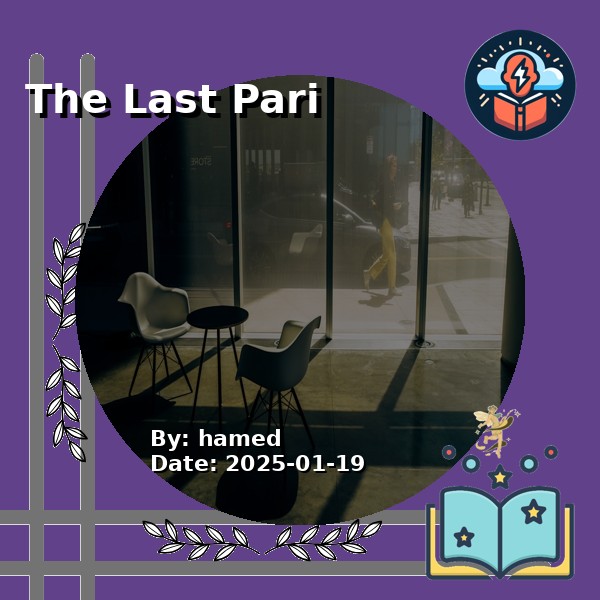The narrow alley off Tehran’s bustling Valiasr Street smelled of roasting chestnuts and damp stone. Beneath a flickering neon sign, an elderly woman sat cross-legged by her modest cart. She wore a faded chador, her hands delicate as she polished tiny glass bottles that glimmered like trapped rainbows. A crooked wooden sign hung from the cart:
"For wishes you didn’t know you needed."
Most passersby barely noticed her. Those who did usually smirked, muttering about old superstitions. But not Leila.
Leila was late for her shift at the hospital, her worn sneakers slapping against the pavement, but something about the woman made her stop. Maybe it was the faint scent of roses that seemed to hang in the air around her, cutting through the diesel fumes. Or maybe it was the way the woman’s eyes—strangely bright for someone so old—seemed to meet hers as though she’d been waiting.
“Do you sell perfumes?” Leila asked, eyeing the shimmering bottles.
“Not perfumes, dear,” the woman replied, her voice soft as a lullaby. “Something better.”
Leila hesitated. She didn’t have time for this. And yet, she found herself crouching by the cart, brushing a strand of hair out of her face. “What is it, then?”
The woman held up a bottle no bigger than Leila’s thumb. Inside, golden flecks swirled like liquid sunlight. “This is for clarity,” she said. “For seeing what your heart truly wants.”
Leila laughed nervously. “And how much does clarity cost?”
The woman tilted her head, her eyes twinkling. “For you, nothing. Only a promise: Be kind, even when it’s hard.”
Leila blinked. “That’s it?”
The woman nodded and placed the bottle in her hand. “You’ll know when to use it.”
Leila pocketed it, murmured a hurried thanks, and dashed off.
The bottle stayed in her bag, forgotten amid the chaos of 12-hour shifts, late-night commutes, and the endless grind of city life. Until one night.
It was past midnight, and Leila sat slumped on the metro, her scrubs stained with blood and sweat. Across from her, a young man in a tattered jacket was being berated by a ticket inspector. He stammered apologies, explaining he’d lost his wallet, but the inspector remained merciless, threatening to call security.
Leila felt a pang of pity. She reached into her bag for spare change and her hand brushed the tiny bottle. Without thinking, she pulled it out and uncorked it.
A soft warmth spread through her chest, and suddenly, she saw things differently. The young man’s trembling hands. The dark circles under his eyes. The exhaustion etched into his face that mirrored her own.
“Excuse me,” she said, standing. “I’ll pay for his ticket.”
The inspector frowned but relented. The young man’s eyes filled with gratitude. “Thank you,” he whispered.
As Leila sat back down, she noticed something strange. The golden flecks from the bottle were no longer inside it—they were swirling in her chest, faint but steady, like embers of a forgotten fire.
Days turned to weeks, and Leila began noticing small changes. The way strangers seemed kinder when she smiled first. The way problems at work seemed less insurmountable when she approached them with patience. The way, no matter how tired she was, a quiet warmth stayed with her, guiding her.
One evening, curiosity tugged her back to the alley. But the cart was gone. In its place was a single feather, white and impossibly delicate, lying on the cobblestones.
Leila picked it up, holding it to the light. It shimmered faintly, like the glass bottles had, and for a moment, she swore she heard a voice—soft and lilting, like a song carried on the wind.
"Be kind, even when it’s hard."
And then the feather dissolved, a gentle breeze carrying its essence into the air.
Leila stood there for a long time, clutching the warmth in her chest, knowing she had met the last pari—and that her wish, subtle and quiet, had already come true.
